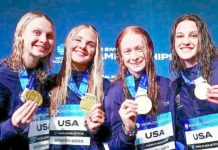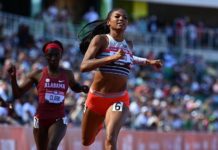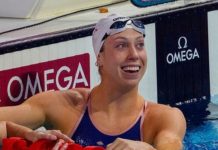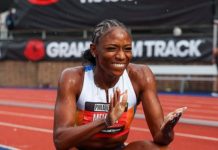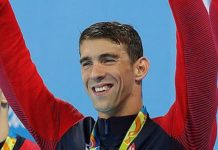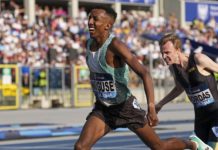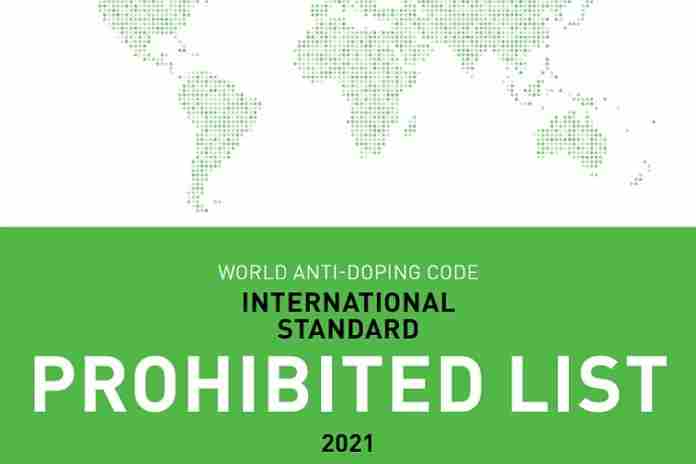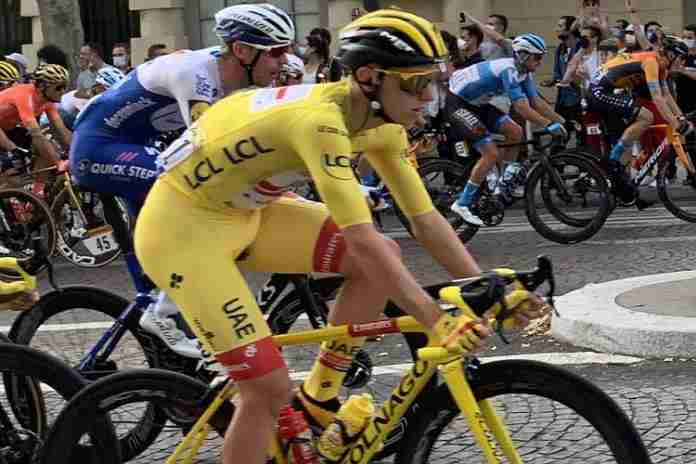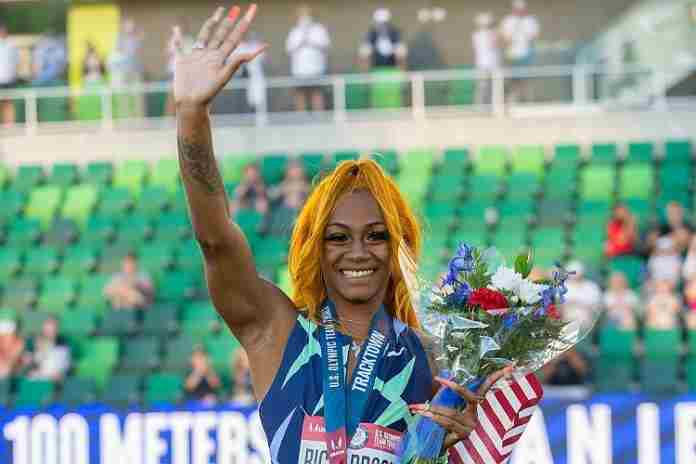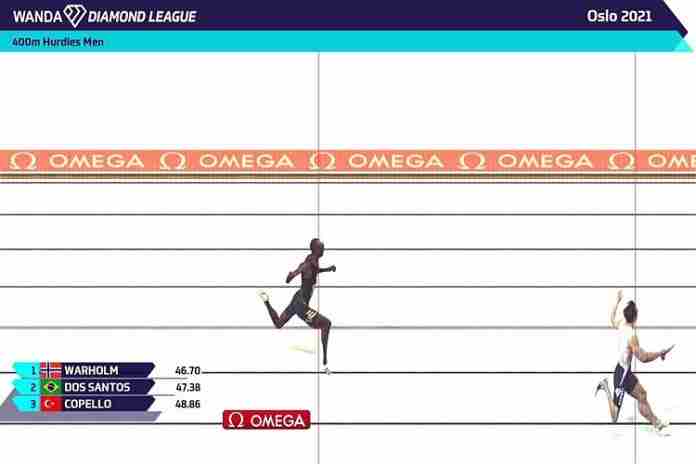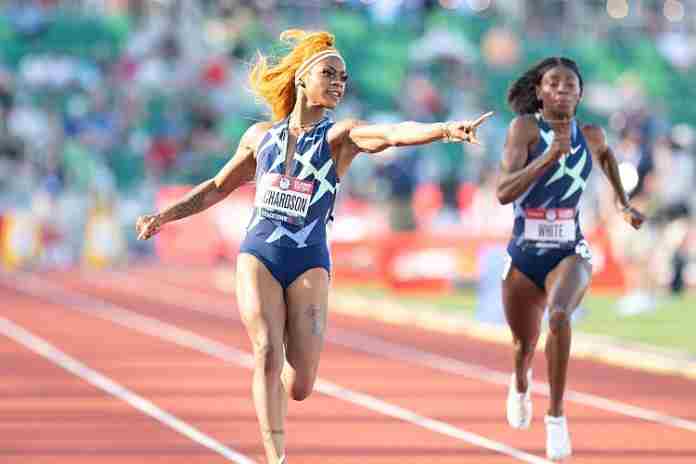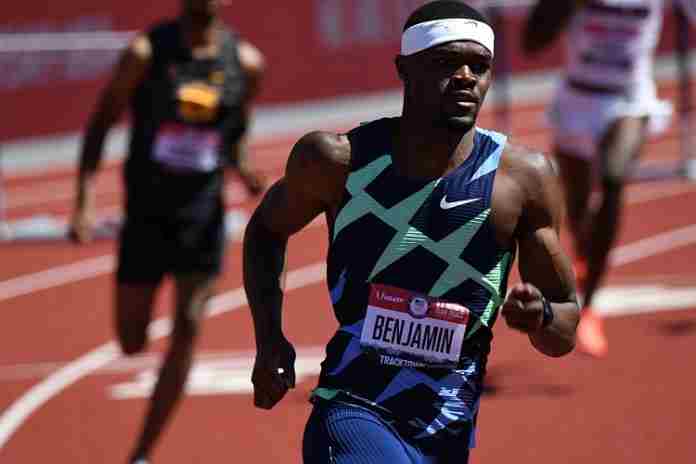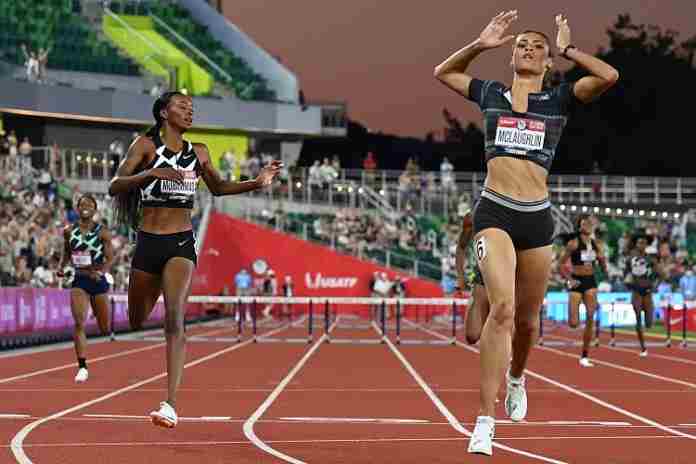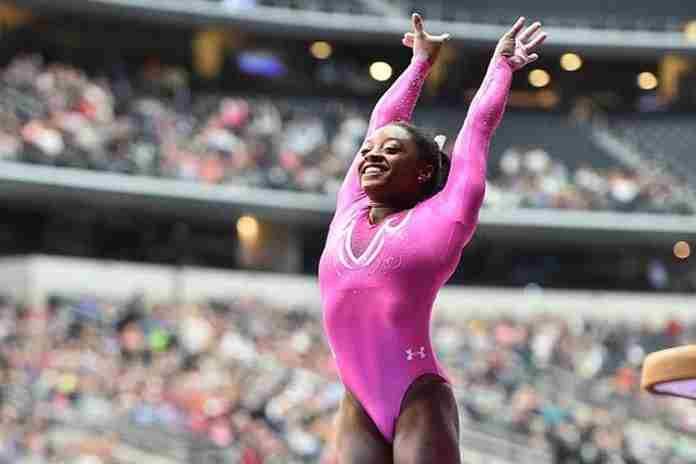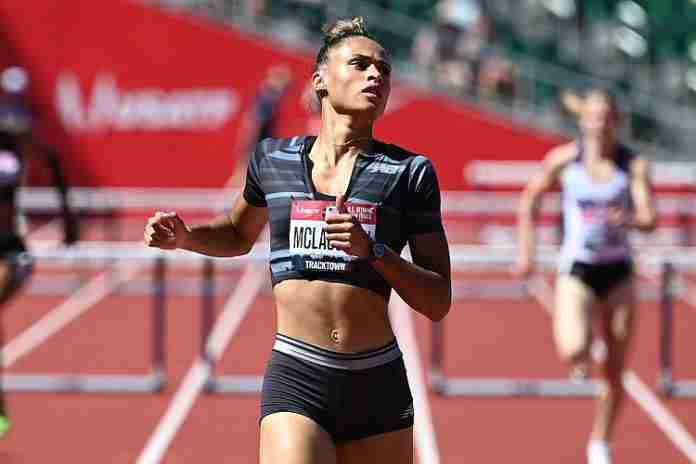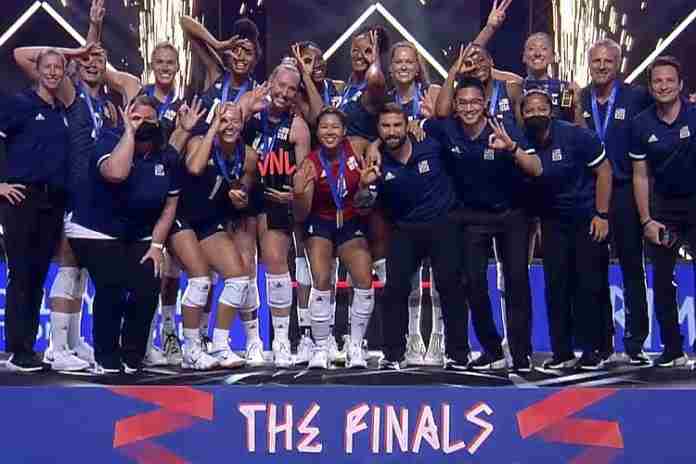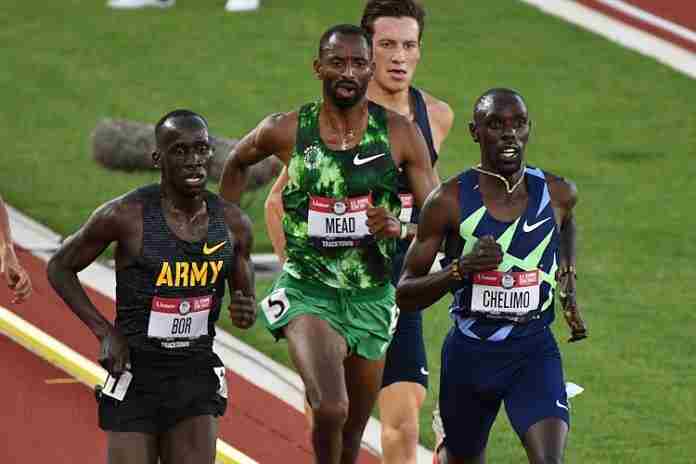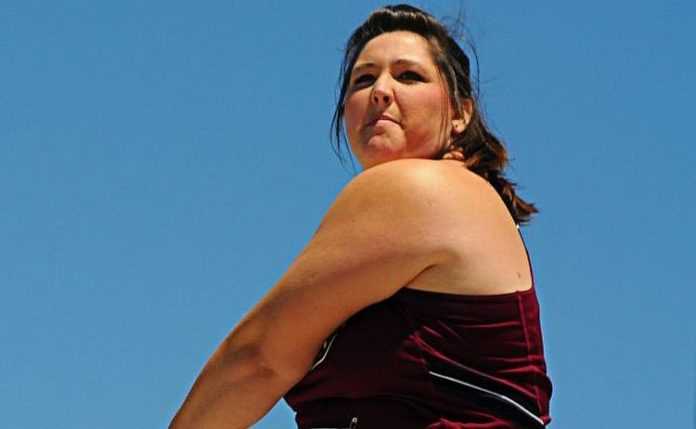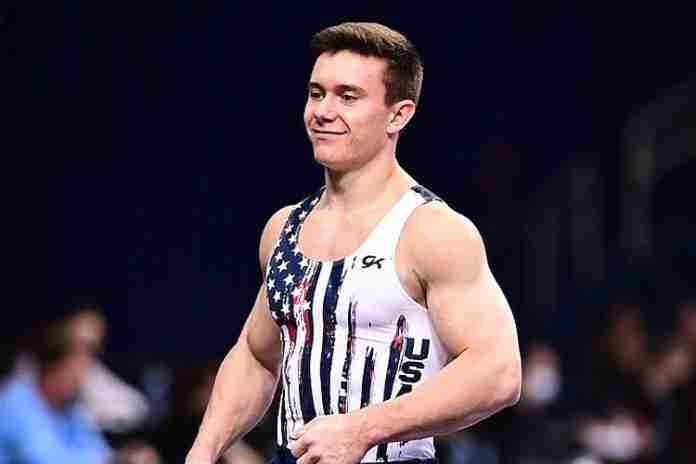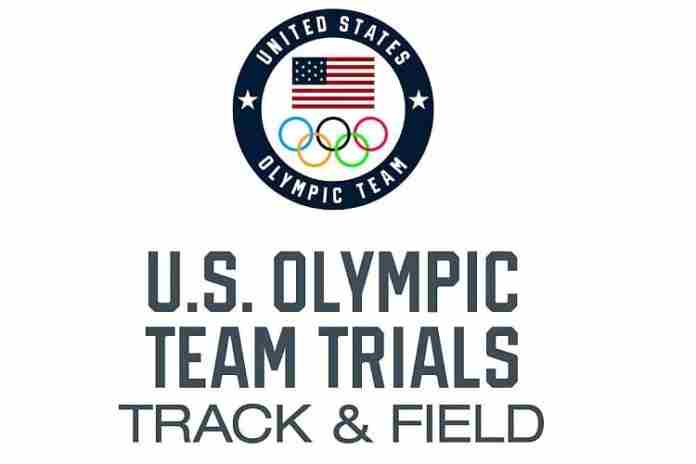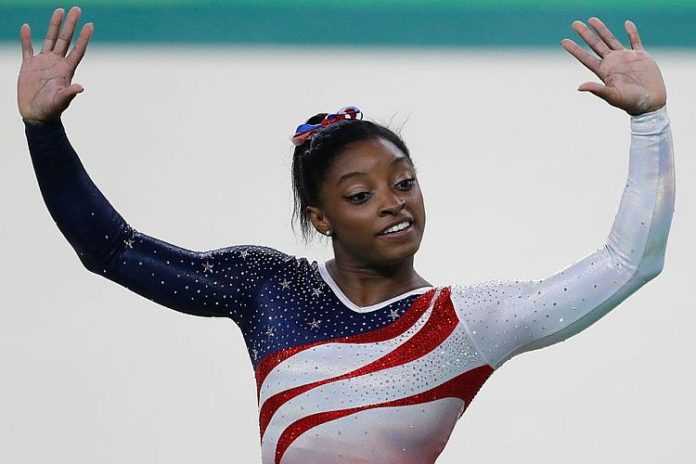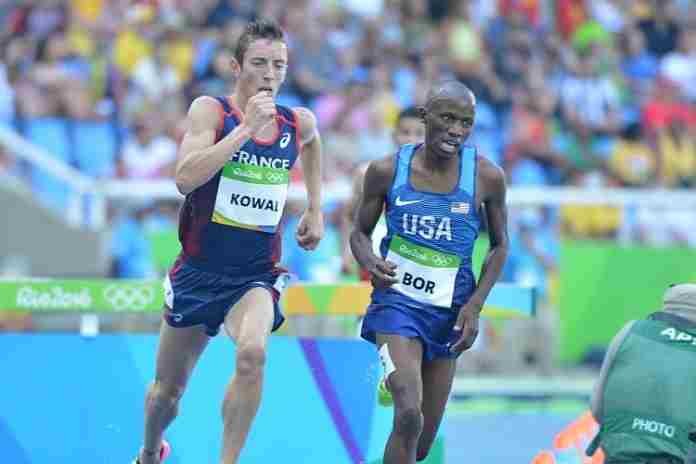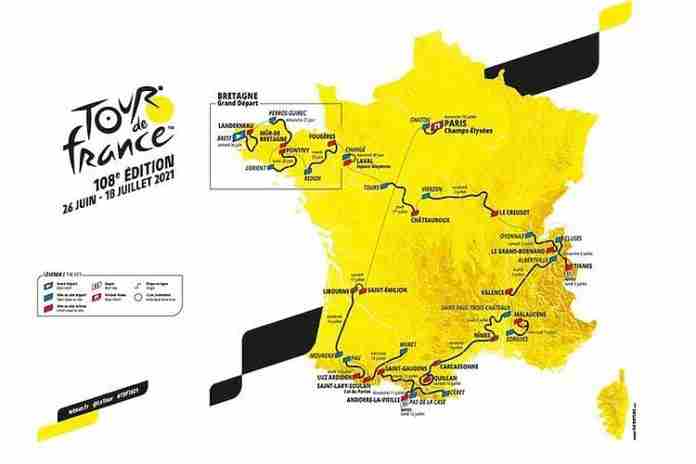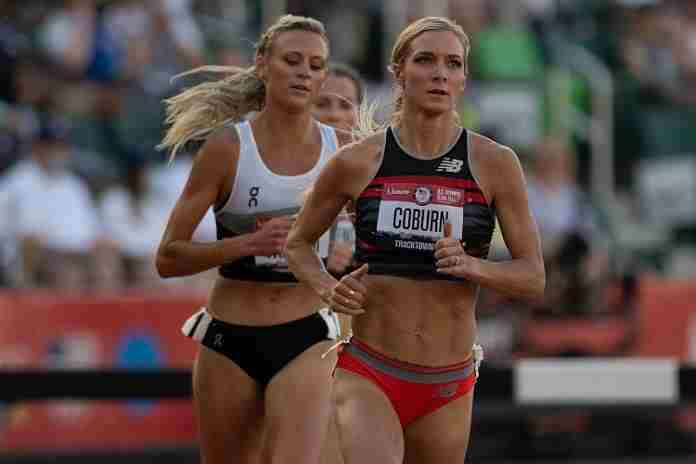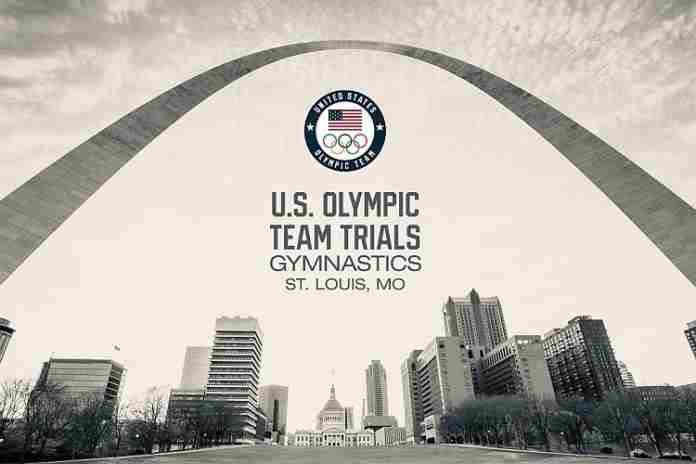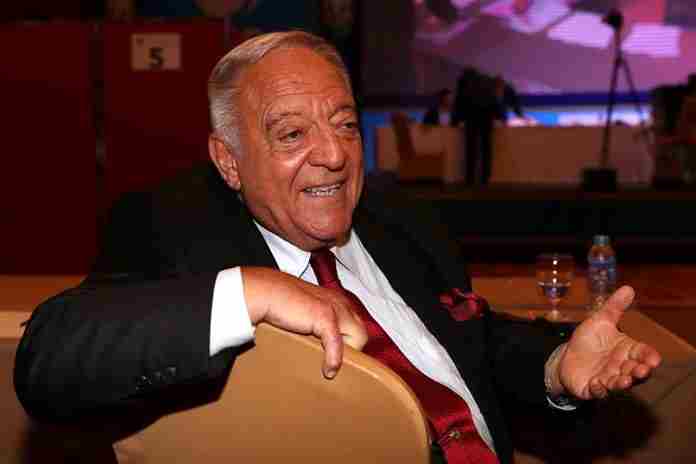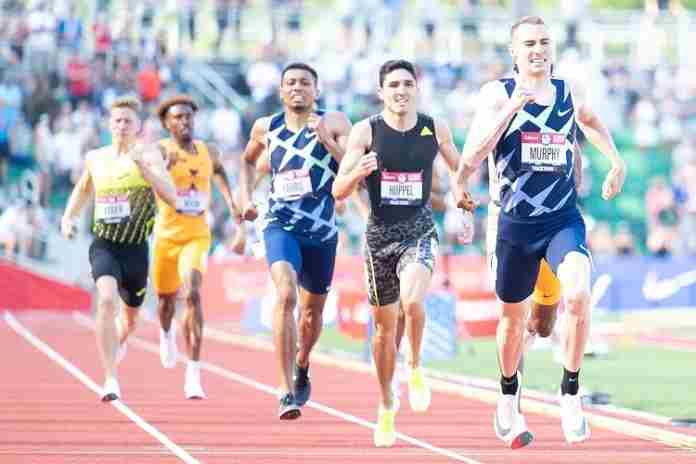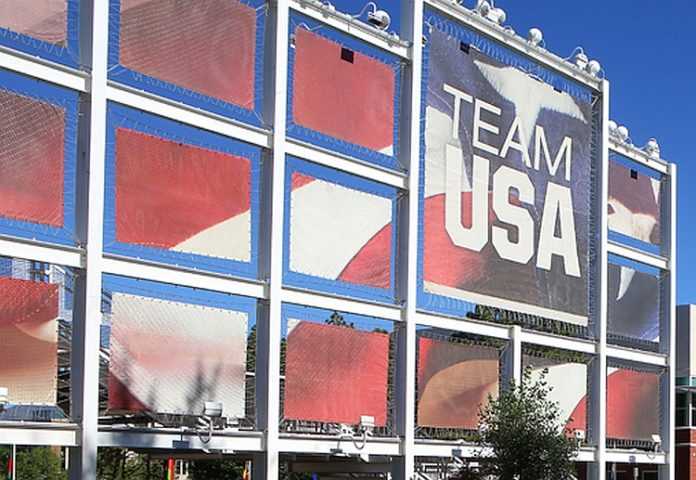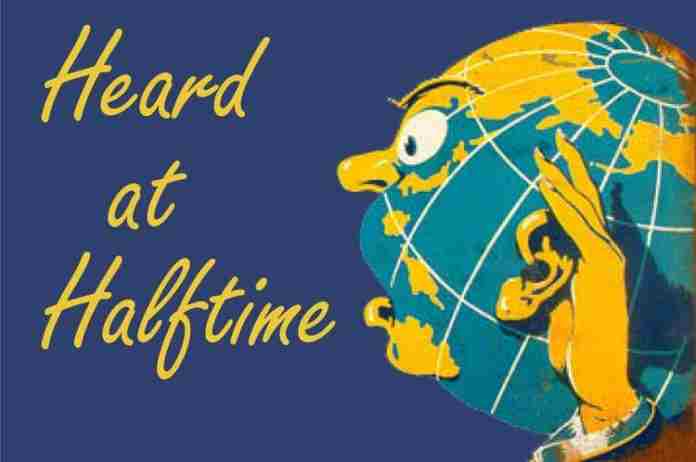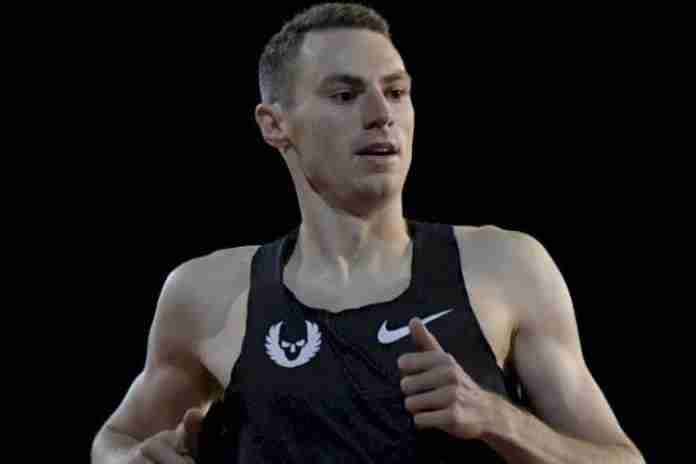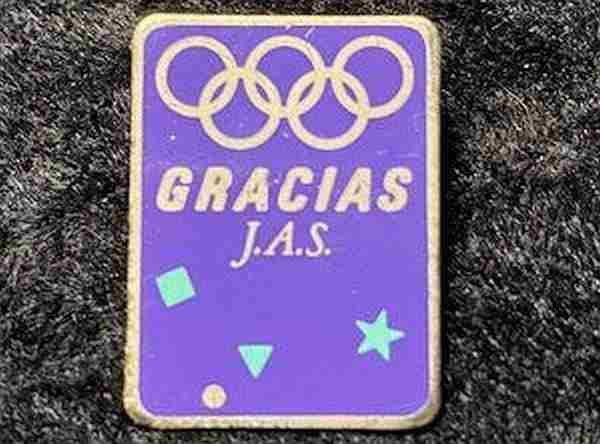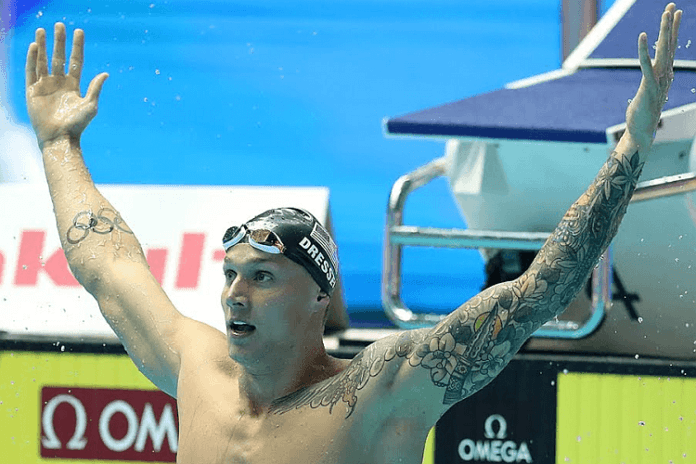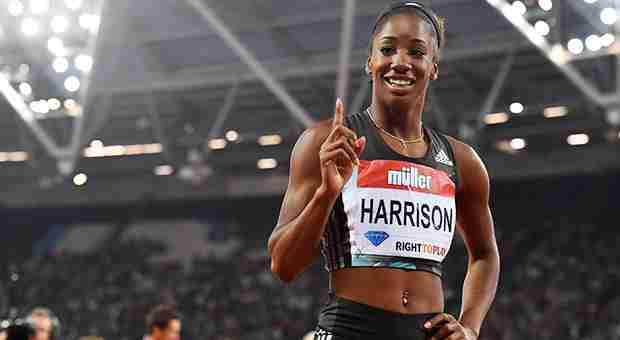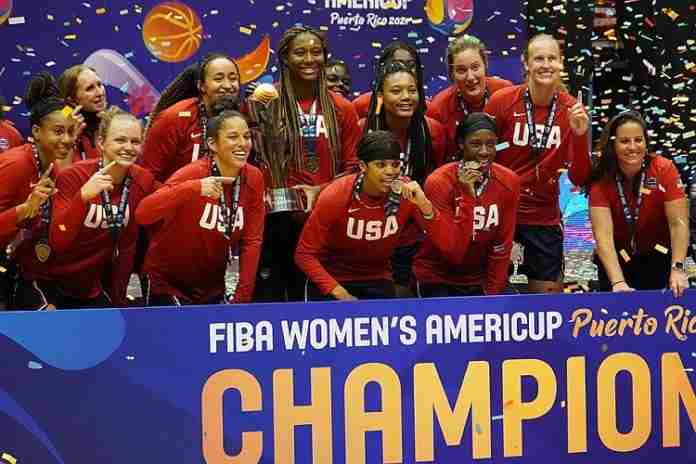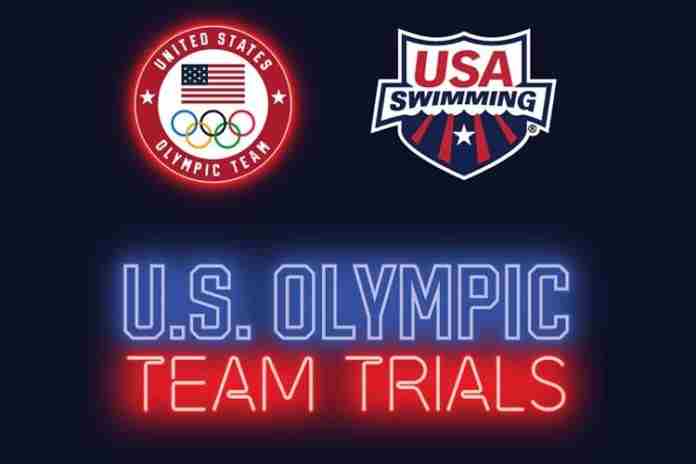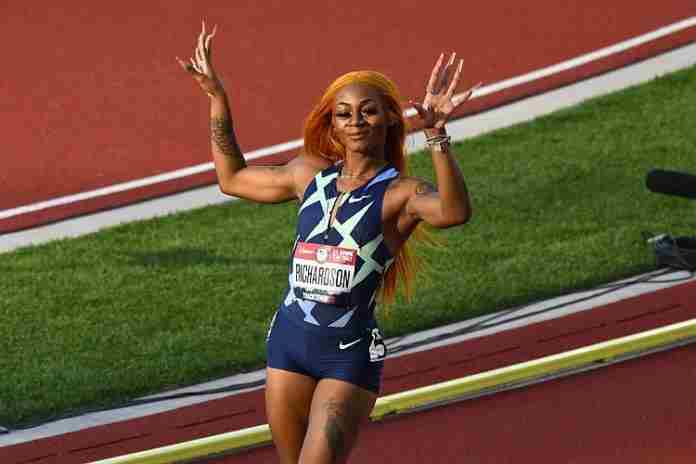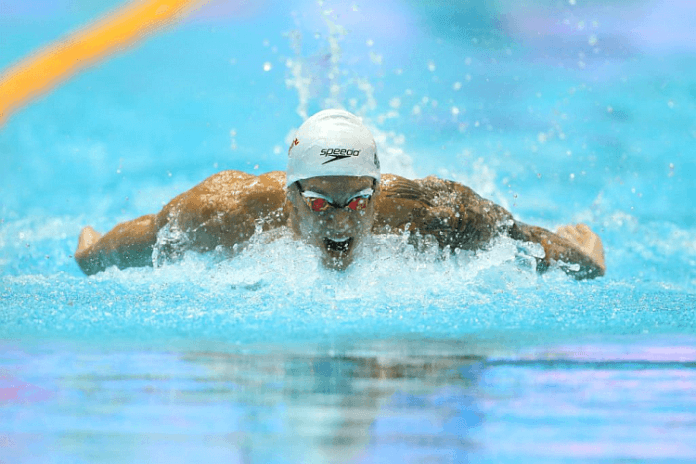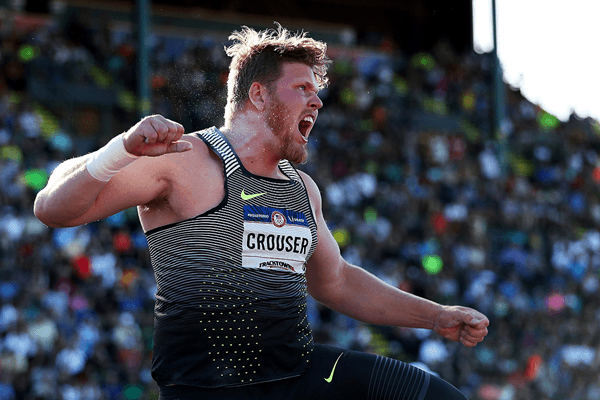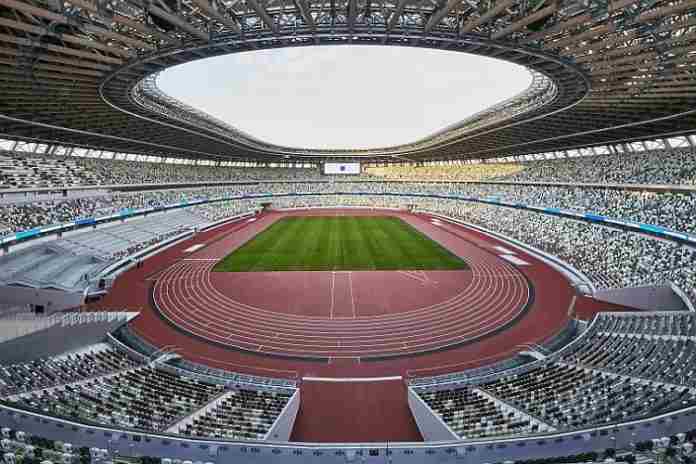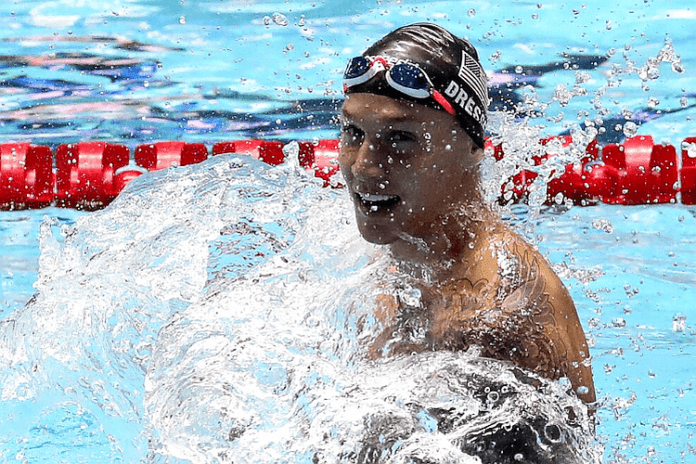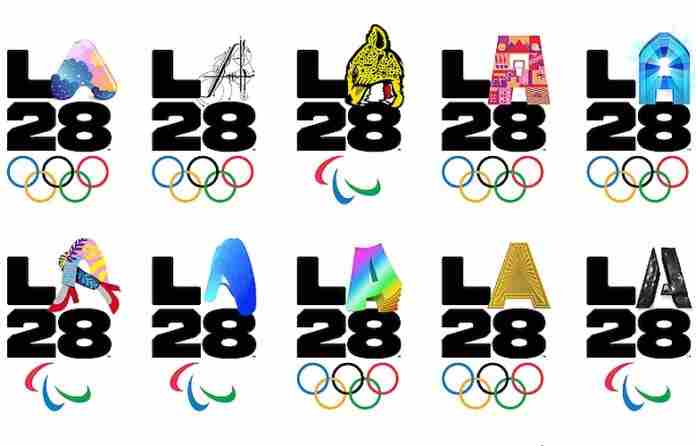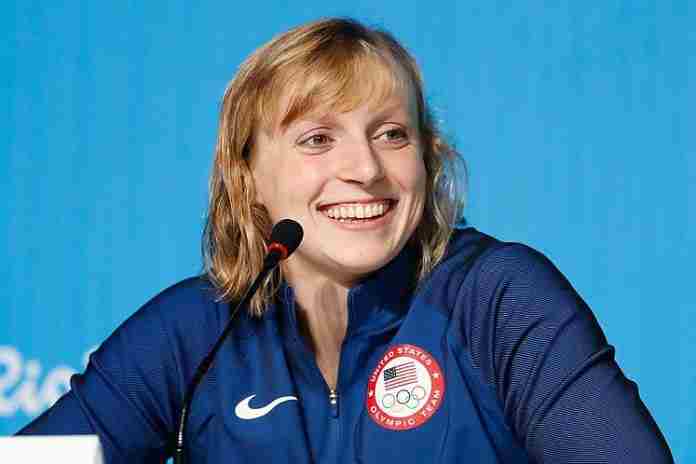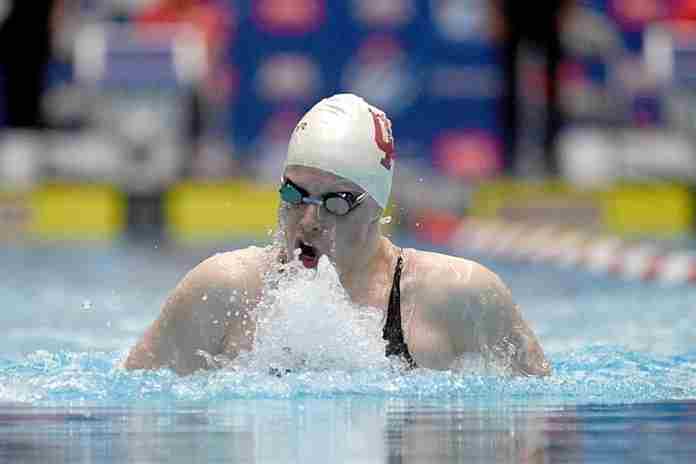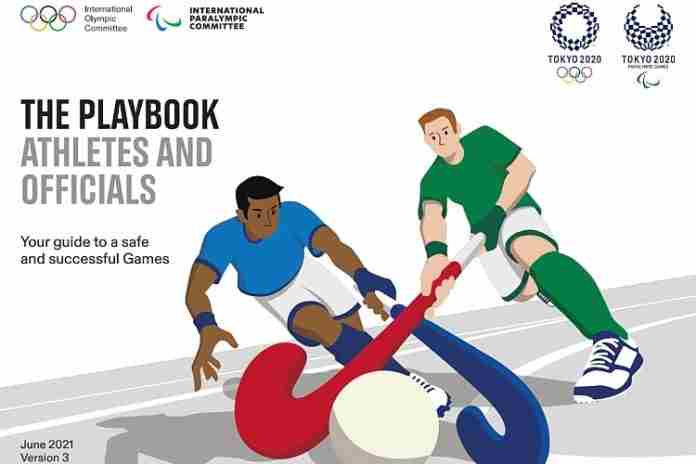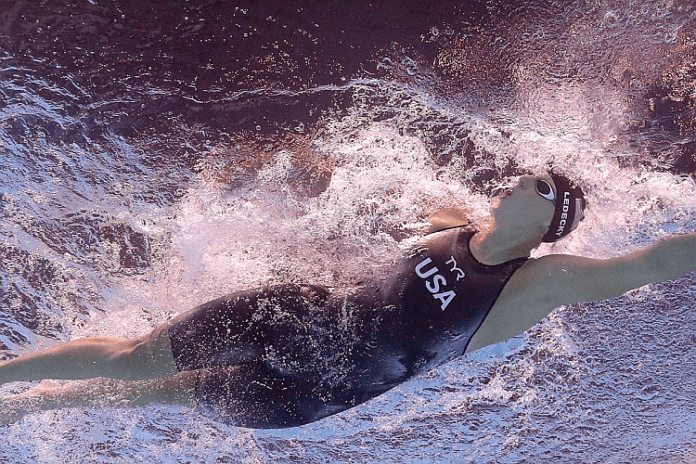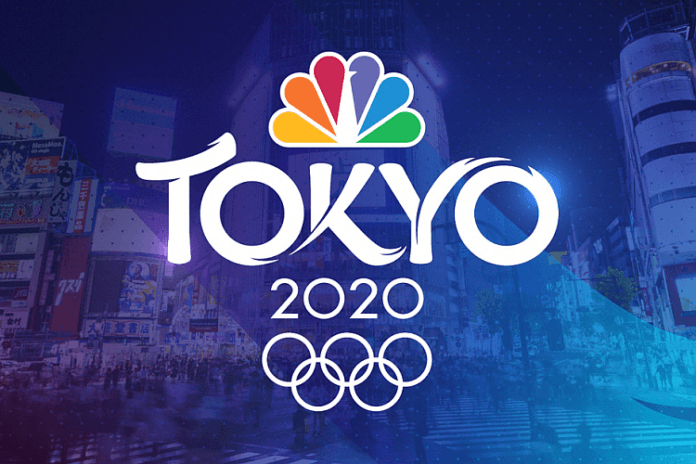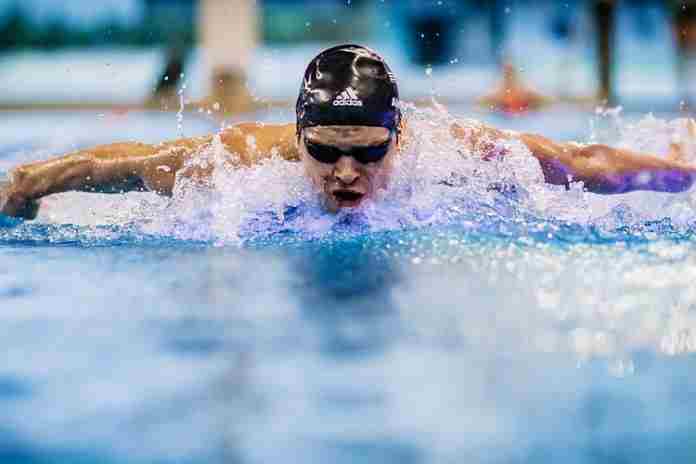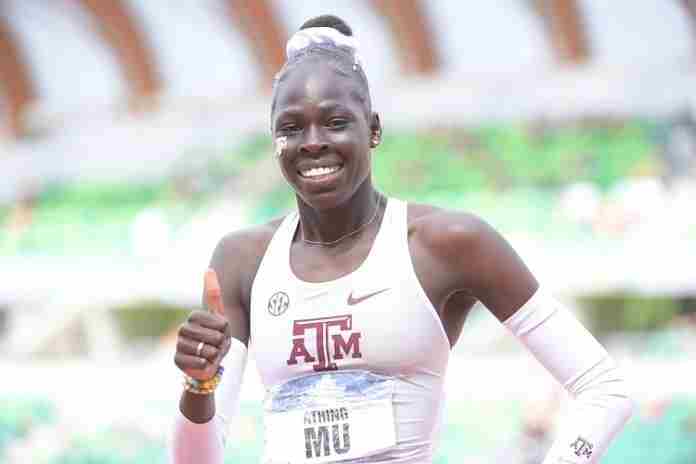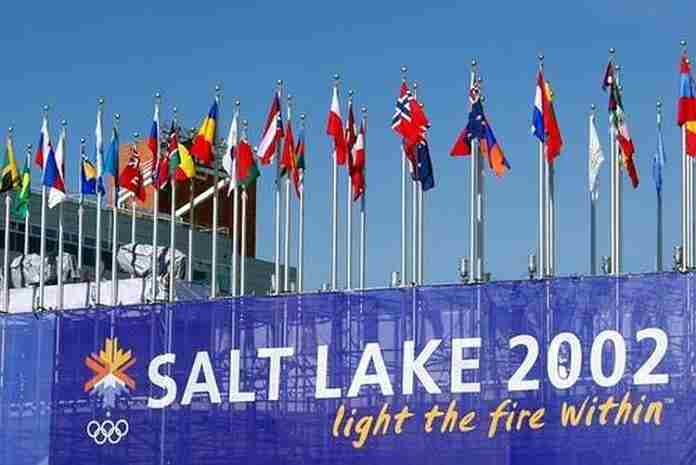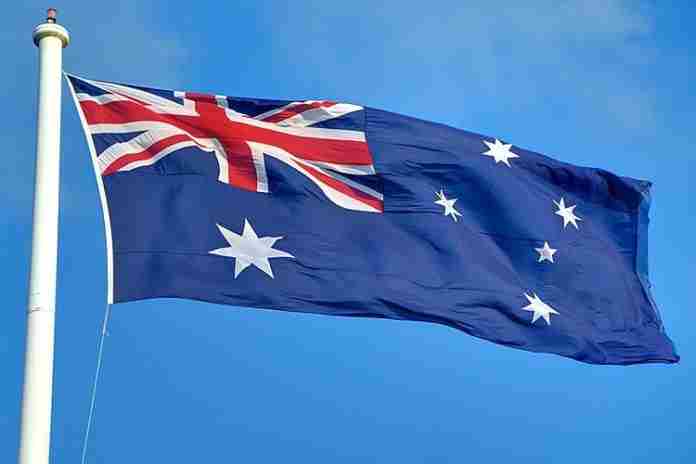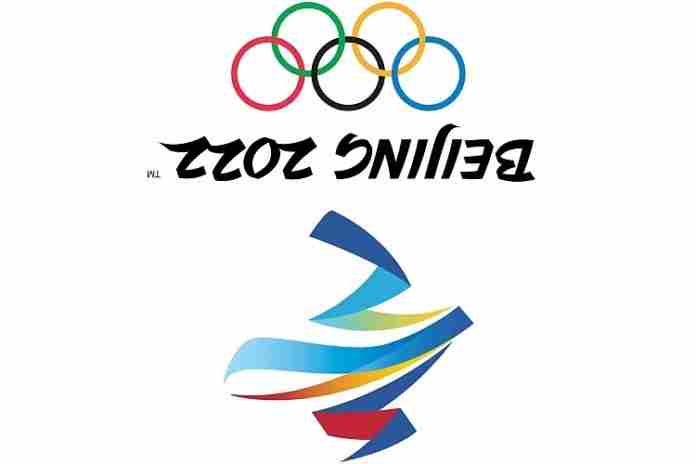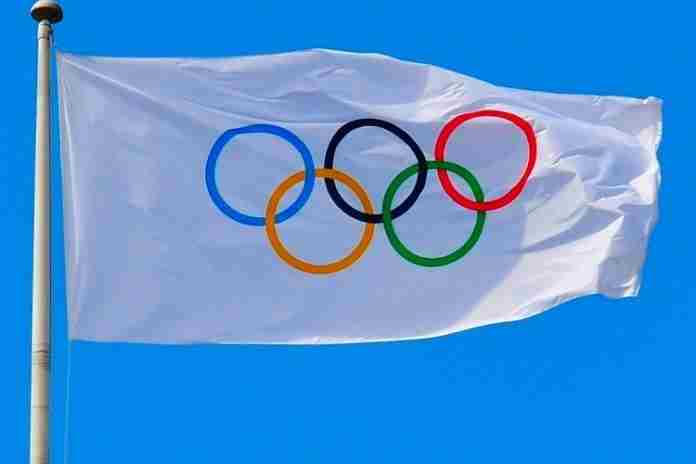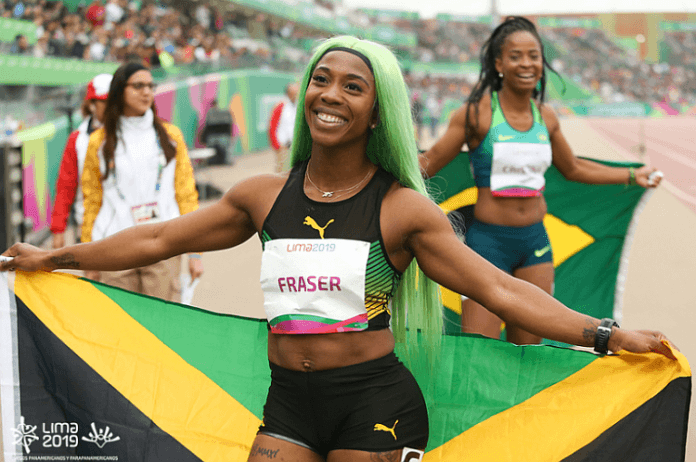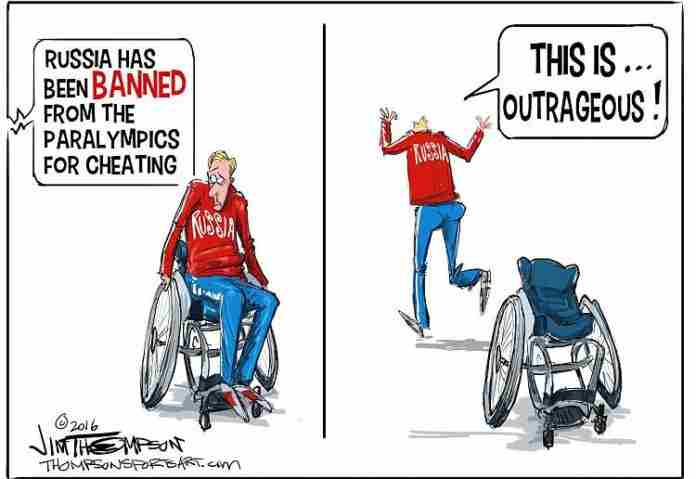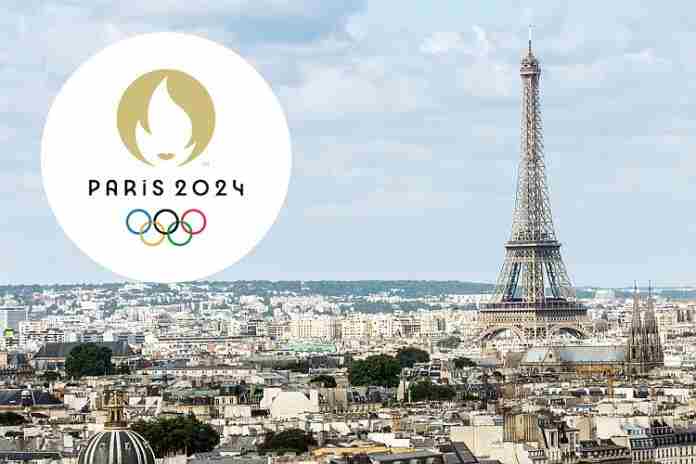(★ Friends: The new bill for server and support costs has arrived. If you would like to support our coverage, please donate here. Your enthusiasm is why this site continues. Thank you. ★)
Headline results of noteworthy competitions around the world/updated/:
● Archery ● The annual SoCal Showdown, in Chula Vista, California, a U.S. Archery Team qualifier series event, was once again a showcase for the American archers who will go to Tokyo.
Jack Williams, the no. 2 men’s qualifier, led the Ranking Round over World Champion Brady Ellison, 674-673, and no. 2 Mackenzie Brown scored 671 to 648 for no. 1 Casey Kaufhold.
In the elimination round, it came down to Ellison and no. 3 Jacob Wukie in the final and Ellison closed him out in three ends, 6-0. Williams won the bronze medal over Olympic alternate Matthew Nofel, 6-5.
The women’s final pitted Brown and Kaufhold once again, and this time it was Brown taking the title by 6-4. Rebekah Hill took the third-place match over Nicole Turina by 6-4.
● Athletics ● Two-time Olympic women’s 100 m gold medalist Shelly-Anne Fraser-Pryce, now 34, set the track & field world on fire on Saturday in Kingston, Jamaica, running a sensational 10.63.
Her victory in the Olympic Destiny Series meet was aided by a modest 1.3 meters-per-second win and was a runaway, with countrywoman Natasha Morrison second in 10.95. It was historic, moving her to no. 2 on the all-time list, with the fourth-fastest time ever run:
10.49 Florence Griffith-Joyner (USA) ‘88
10.61 Griffith-Joyner ‘88
10.61 Griffith-Joyner ‘88
10.62 Griffith-Joyner ‘88
10.63 Shelly-Ann Fraser-Pryce (JAM) ‘21
10.64 Carmelita Jeter (USA) ‘09
10.65 Marion Jones (USA) ‘98
Fraser-Pryce improved her old lifetime best of 10.70, set in 2012 and in doing so, claimed the Jamaican record after having been in a tie with 2016 Olympic champ Elaine Thompson-Herah.
Prior world leader Sha’Carri Richardson of the U.S. hardly cowered after hearing the news. She tweeted:
“My presence in this track game making history happen, no need for a thank you.”
That evoked a thunderous response – for and against – on Twitter, which will only raise the interest in the women’s 100 heading into the U.S. Olympic Trials starting 18 June.
Comment: Thanks, Kerrii. This is exactly what the sport needs. Badly.
¶
Thompson-Herah was also on notice after seeing the 10.63 and responded with convincing wins at the NACAC New Life Invitational in Miramar, Florida. She took her heat in a wind-aided 10.92 (+3.0 m/s), then stormed to a win in the final in 10.87 (+1.2), her second-fastest time of 2021.
American Tianna Bartoletta, the reigning Olympic long jump champion, was second in the final with a stunning 10.96, ahead of Jamaica’s Briana Williams (10.97). That’s Bartoletta’s fastest 100 m since 2016 and makes her an instant contender for Tokyo at the U.S. Olympic Trials coming up in a couple of weeks, in addition to the long jump.
Thompson also won the women’s 200 m in 22.54 (+1.2 m/s).
Maybe the men were inspired too, as world leader Trayvon Bromell set a new lifetime best of 9.77 in the men’s 100 m final, breaking his 9.84 prior best from 2015 and 2016. He brought fellow American Marvin Bracy with him to a new best of 9.85 (wind: +1.5 m/s), improving from 9.93 back in 2015!
How special is this? Bromell is only the ninth man in history to run sub-9.80 and is now seventh on the all-time list, and fourth all-time on the U.S. list. Wow! Bracy’s 9.85 tied him for 14th all-time and ties him for sixth all-time U.S. with former world-record holder Leroy Burrell and Mike Rodgers.
Defending Olympic women’s 400 m hurdles champ Dalilah Muhammad ran her second race of the season and moved to no. 4 on the world list at 54.50, beating no. 2 Ronda Whyte of Jamaica (55.65).
Nigeria’s Tobi Amusan won the women’s 100 m hurdles in a wind-aided 12.44 (+2.2 m/s), barely over the allowable, ahead of Costa Rica’s Andrea Vargas (12.76w).
¶
On Sunday, Dutch star Sifan Hassan smashed the world record in the women’s 10,000 m at the FBK Games in Hengelo (NED), finishing in 29:06.82 vs. Ethiopian Almaz Ayana’s mark of 29:17.45 from the 2016 Rio Games.
Hassan cruised through 5,000 m in 14:38.75, then finished the second half of the race in 14:28.07, winning by more than a minute and a half from Kenya’s Irine Kimias (30:37.24). Hassan now owns world marks in the mile, the hour and the road 5 km.
There was other hot running in Hengelo, with American Fred Kerley winning the 400 m in 44.74; Jake Wightman (GBR) winning the 1,500 m in 3:34.67 from Abel Kipsang (KEN: 3:35.63); and Olympic 110 m hurdles champ Omar McLeod running 13.08 ahead of American Devon Allen (13.32). Swede Mondo Duplantis towered over the men’s vault at 6.10 m (20-0).
Britain’s Dina Asher-Smith won the women’s 100 m in 10.92 (+0.8 m/s), which would normally have been an impressive mark! Puerto Rico’s world-leading Jasmine Camacho-Quinn won the women’s 100 m hurdles in a speedy 12.44 (+0.5 m/s), giving her two of the top three times in the world in 2021. Femke Bol (NED) moved up to a tie for no. 2 in 2021 in the 400 m hurdles, winning in 54.33 over Ukraine’s Anna Ryzhykova (54.59: world no. 5).
¶
Also on Sunday, the women’s discus was the star event at the USATF Showcase at Prairie View A&M. American Record holder Valarie Allman got off her best throw of the season, measuring 67.74 m (222-3) on her final effort, equal to the no. 3 throw in U.S. history and no. 3 on the 2021 year list. Her fourth throw of 67.07 m (220-0) is the no. 10 throw in American history; she now has four of the top 10 ever.
¶
The American Track League’s Music City Track Carnival was held in rainy Nashville, but that hardly mattered to Sydney McLaughlin, running her first 400 m hurdles race since 2019. She destroyed the field by more than two seconds, finishing in a world-leading 52.83, her third-fastest race ever. Pretty good, right? “Definitely have things to work on” is what she said afterwards. The U.S. now stands 1-2-4 in the world for 2021.
Steven Gardiner (BAH) won the men’s 400 m in 45.06 and Ashland’s Trevor Bassitt ran a lifetime best of 48.80 in the men’s 400 m hurdles to best fellow American Kenny Selmon (48.96) and move to no. 8 in the world for 2021.
In the field, New Zealand star Tom Walsh won the men’s shot at 22.00 m (72-2 1/4), but was the only finisher as American Nick Ponzio had six fouls!
World leader Katie Nageotte (USA) won the women’s vault at 4.85 m (15-11), short of her 4.93 m (16-2) earlier this year, but higher than anyone else has cleared in 2021.
¶
The parade of new world-leading marks continues, with American Amanda Eccleston taking the mile in 4:30.06 at the Hoka Festival of Miles in St. Louis on 3 June, and Portugal’s Auriol Dongmo reaching 19.75 m (64-9 3/4) in Huelva, Spain on the same day. It was a lifetime best for Dongmo, who was the 2021 European Indoor Champion earlier this year.
On Sunday, Sandra Arenas (COL) won the World Athletics Race Walking Challenge 20 km in La Coruna (ESP) in a world-leading 1:28:24, ahead of Alegna Gonzalez (MEX: 1:28:40). The men’s 20 km was won by 2018 European silver medalist Diego Garcia (ESP) in 1:19:37 in a tight race with Swede Perseus Karlstrom (SWE: 1:19:44).
● Baseball ● The United States punched its ticket to Tokyo by sweeping through the WBSC’s Baseball Americas Qualifier in St. Lucie and West Palm Beach, Florida.
The American squad, managed by former Angels skipper Mike Scioscia, defeated Nicaragua (7-1) and the Dominican Republic (8-6) in the Opening Round, then stomped Canada (10-1) and Venezuela (4-2) on Saturday.
The U.S. was led by outfielder Luke Williams (Phillies minor leaguer) who batted .444 and had six runs batted in; catcher Mark Kolozsvary (Reds minor leaguer: .417, 2 home runs, 5 RBI) and infielders Triston Casas (Red Sox minor leaguer) and Todd Frazier (free agent; two-time All-star for Cincinnati in 2014-15), who both batted .400. Matthew Libertadore (St. Louis minor leaguer) started twice for the U.S., including the final game vs. Venezuela and finished with a 1-0 record and a 1.86 earned-run average.
The Olympic tournament now includes Japan, South Korea, Mexico, Israel and the U.S. One more team will be included, from the WBSC Baseball Final Qualifier in Puebla, Mexico, coming on 22-26 June. Originally slated to be held in Taichung (TPE), governmental restrictions due to the pandemic forced a change of venue and the Chinese Taipei team had to withdraw. Australia, The Netherlands, the Dominican Republic and Venezuela will compete for the final spot.
● Beach Volleyball ● Americans Sarah Sponcil and Kelly Claes celebrated making the U.S. Olympic team this week by capturing their second straight FIVB World Tour title at the Ostrava Beach Open in the Czech Republic.
They swept aside Brazilians Barbara Seixas de Freitas and Carol Salgado in straight sets in the semis, then defeated Joana Heidrich and Anouk Verge-Depre (SUI), 21-18, 21-15. Said Sponcil:
“We’re on a good roll right now. We had our first gold medal [last week] and qualified for the Olympics, but we tried to put that on the back burner and really focus on this tournament. And we came up with a win. I have an amazing partner and the Czech fans are amazing!”
Salgado and Seixas got past reigning World Champions Sarah Pavan and Melissa Humana-Paredes (CAN) by 21-15, 21-16, for the bronze medal.
In the men’s tournament, Dutch stars Alexander Brouwer and Robert Meeuwsen – the 2013 World Champions – won a grueling final over home favorites Ondrej Perusic and David Schweiner (CZE) by 13-21, 21-19, 15-13. Brazilians Andre Stein and George Wanderley took the bronze medal from Viacheslav Krasilnikov and Oleg Stoyanovskiy (RUS), 27-25, 21-18.
The U.S. men qualified two teams for Rio at the tournament. Taylor Crabb and Jake Gibb clinched last Friday and Nick Lucena and Phil Dalhausser clinched on Saturday. Going into Ostrava, Crabb and Gibb ranked ninth in the FIVB Olympic Rankings and Lucena and Dalhauser 10th, and when Tri Bourne and Trevor Crabb (ranked 14th; Taylor’s brother) went out in the Round of 16, they were mathematically eliminated from contention.
The theme for the U.S. men in Tokyo has to be “forever summer.” Gibb is 45 and will be participating in his fourth Olympic Games and is reportedly will be the oldest volleyball Olympian ever. Dalhausser, 41, will be making his fourth Olympic appearance and won the 2008 Olympic title with Todd Rogers.
Lucena is also 41 and going to his second Games; he and Dalhauser tied for fifth in Rio. Crabb is the baby of the group at 29, and is making his Olympic debut.
● Cycling ● It was a wild week at the eight-stage Criterium du Dauphine in France, with the overall lead changing after stages 5, 6 and 7.
Austrian Lukas Postlberger took over the leader’s jersey after his win in stage 2 and stayed in front after wins by Alexey Lutsenko (KAZ) over Ion Izagirre (ESP) in the Stage 4 time trial and Geraint Thomas (GBR) outrunning Italy’s Sonny Colbrelli in the hilly Stage 5.
But Lutsenko took the race lead with a seventh-place finish in Stage 6, with its difficult triple climb and uphill finish. The stage was won by Spanish star Alejandro Valverde, ahead of Britain’s Tao Geoghegan Hart.
But Lutsenko lost the lead after a 10th-place finish in Stage 7, won by Ukraine’s Mark Padun, who sprinted away in the final 4.7 km. Second was Australian star Richie Porte, 34 seconds behind, but suddenly the race leader by 16 seconds going into Sunday’s six-climb finale with an uphill finish into Les Gets.
Padun won again in stage 8, breakaway from the field with 27 km remaining and taking the victory by 1:36 over Jonas Vingegaard (DEN) and Patrick Konrad (AUT). Porte stuck like glue to the other contenders and finished eighth, right with Lutsenko, Thomas, Wilco Kelderman (NED) and fellow Aussie Jack Haig, who finished 2-3-4-5 by 0:17-0:29-0:33-0:34.
For Porte, 36, he adds the Criterium du Dauphine to a sparkling resume which also include the Tour Down Under, Tour de Suisse, Tour de Romandie and Volta Ciclista a Catalunya. He was third overall in the 2020 Tour de France and will be one to watch again this year.
¶
Also in France was the BMX Freestyle World Championships, in Montpelier, with the Freestyle Park finals scheduled for Monday (7th) and Flatland on Tuesday (8th).
In the Park semifinals, Americans finished 1-2-4 with Daniel Sandoval (94.06), Nick Bruce (92.64) and Justin Dowell (89.48). Australia’s Logan Martin was third (91.94).
The women’s qualification leaders were reigning World Champion Hannah Roberts of the U.S. (84.25), fellow American and former World Champion Perris Benegas (83.80) and American Chelsea Wolfe (80.55).
● Football ● /updated/Mexico has dominated the U.S. over the 87 years since their first meeting in 1934, and the CONCACAF Nations League final showed that misery loves company.
Just 1:11 into the game, U.S. defender Mark McKenzie made a bad clearance in front of the U.S. goal that was taken by Mexican striker Jesus Corona, who dribbled left and sent a laser past keeper Zach Steffen from the left side of the goal into the top right corner for a 1-0 lead. It’s the fastest goal scored against the U.S. since at least 1990.
Mexico scored again in the 24th minute when Hector Herrera sent a cross from the left side to beyond the U.S. goal and Hector Moreno headed it past Steffen, but the goal was disallowed on a video review for a very close offside call.
That sudden change was compounded three minutes later with a U.S. corner that found Wes McKennie for a header past Mexican keeper Memo Ochoa, but it hit the left goal post and rebounded to Gio Reyna standing in front of the net. He slammed it home for a 1-1 tie.
Mexico dominated play in the final 15 minutes of the first half and got Hirving Lozano behind the U.S. defense in the 43rd minute, but Steffen came out and deflected his shot in a one-on-one duel in the middle of the box. Mexico ended with 61% possession and a 7-5 edge in shots.
The U.S. had a better start to the second half and developed a couple of chances, but had to replace Steffen with Ethan Horvath in the 67th minute due to injury. But it was Mexico’s Ochoa under pressure soon after and he made a sensational save in the 72nd minute to deny McKennie on another header off a corner. McKenzie tried the same thing in the 76th minute, but Ochoa saved his header as well.
But in the 79th minute, substitute striker Diego Lainez received a pass with space at the right side of the U.S. goal, moved toward the center and fired a left-footed shot that skipped past Horvath for a 2-1 lead. The U.S. offense came alive quickly, however, finding the equalizer in the 82nd minute on another corner that McKennie stunningly headed into the right side of the Mexican goal for a 2-2 tie.
The game was stopped at 90+6 when a homophobic chant in Spanish was heard in the crowd, under a new CONCACAF anti-discrimination protocol. It resumed two minutes later, and regulation time ran out. Mexico finished the first 90 minutes with 55% of the possession and a 13-11 advantage in shots.
Mexico had a 5-1 advantage in shots in the first extra-time period, but Horvath was not severely challenged.
In the 111th minute, a run by Christian Pulisic into the box was blocked by Mexican defender Carlos Salcedo, who tripped him and was called for a foul. A subsequent video review resulted in a penalty kick, taken by Pulisic in the 114th minute, sending a right-footed rocket into the top right corner of the goal for a 3-2 lead. A hail of bottles from Mexican fans came onto the U.S. players after the goal, one of them hitting Reyna directly.
In the 120th minute, a video review was made on a possible Kellyn Acosta hand-ball and a penalty was given for Mexico. Andres Guardado’s shot flew toward the left side of the goal, but Horvath guessed correctly and blocked it with his right arm, off to the side to a roar from the crowd.
The game was increasingly chippy, with more drinks thrown from the stands, but after 131 minutes, the whistle blew and the U.S. had a 3-2 win and the inaugural CONCACAF Nations League title. Wow.
Mexico ended with 57% possession and a 21-14 lead in shots, but it wasn’t enough.
● Golf ● Yogi Berra was right: it’s not over until it’s over. American Lexi Thompson was sailing through the U.S. Women’s Open at The Olympic Club in San Francisco with a one-under 34 through the first nine holes on Sunday, then it all went wrong.
The final-day leader at -1, she started the back nine with a par, then went double bogey-par-par-bogey-par-par-bogey-bogey to finish at +4 for the day and finish third at -3 (281) for the tournament.
The beneficiaries were Japan’s Nasa Hataoka and Yuka Saso of The Philippines, who shot 68 (-3) and 73 (+2), respectively, to finish in a tie for the lead at -4 (280) after 72 holes. On to a playoff!
Both made pars on the first two playoff holes, then Saso made a brilliant approach from the rough and birdied the third hole and Hataoka could not match, giving Saso her first LPGA Tour win! She had won twice on the LPGA of Japan Tour. Amazing.
● Gymnastics ● /Updated/The annual U.S. Championships took center stage this week in Ft. Worth, Texas, a final prep for the Olympic Trials later this month. The format featured a double All-Around for both men and women.
The first men’s competition showcased NCAA All-Around winner Brody Malone of Stanford (86.250), tying for first place on Vault and second in the High Bar. Stanford’s Brandon Briones and veteran Yul Moldauer tied for second (83.600), with Shane Wiskus fourth (83.350). Star Sam Mikulak was seventh (82.450).
On Saturday, Mikulak came back with the best score of the day at 84.950 to top Malone (84.450) and Moldauer (84.350). In the combined standings, Malone won at 170.700, followed by Moldauer (167.950), Mikulak (167.400), Briones (167.150) and Allan Bower (166.150).
The two-session apparatus winners included Eddie Penev on Floor (29.750), Stephen Nedoroscik on Pommel Horse (30.200), Alex Diab on Rings (29.600), Malone on Vault (29.000), Moldauer on Parallel Bars (29.600) and Mikulak on the High Bar (29.600).
The women’s program was, of course, all about Olympic superstar Simone Biles. She had the first-competition top scores in Vault, Beam and Floor and was second the Uneven Bars, scoring a total of 59.550. Well behind, but still impressive were Worlds Team gold medalist Sunisa Lee in second 57.350, followed by Jordan Chiles (56.900), Jade Carey (55.450) and Leanne Wong (55.300).
Veteran stars Morgan Hurd, Riley McCusker and Laurie Hernandez only competed on one or two of the apparatus. All placed 18th or worse, except for McCusker, who was third on Bars in her only event.
The women’s final All-Around competition on Sunday showed Biles at an even higher level, scoring 60.100, posting wins in the same three events, but scoring 15.500 on Vault, 14.700 on Bars, a much higher 14.900 on Beam and a superb 14.950 on Floor.
Biles’ two-competition total was 119.650, a staggering 4.7 points ahead of Lee’s 114.950 (57.350 + 57.600) in second. Chiles was third (114.450: 56.900 + 57.550) and Emma Malabuyo popped up to fourth (110.450: 54.450 + 56.00) as Wong dropped to fifth, scoring 54.850 on Sunday (110.150 total).
In the combined apparatus scores over two days, Biles won on Vault (31.350), Beam (29.250) and Floor (29.600). She was third on Bars (29.450), behind Lee (30.200) and McCusker (29.750). Hurd struggled again on Beam and Floor and Hernandez did not compete on Sunday.
The Olympic Trials are next, in St. Louis from 24-27 June.
¶
Host Brazil dominated the Pan American Artistic Championships in Rio de Janeiro (BRA), winning men’s and women’s Team event, the individual All-Around titles with Caio Souza (men: 84.450) and Rebeca Andrade (women: 56.700), three men’s apparatus titles (all by Souza) and two women’s apparatus victories.
The American men’s squad of Cameron Bock, Vitaliy Guimaraes, Paul Juda and Riley Loos finished second in the Team event and Juda was second to Souza in the men’s All-Around (83.000), picking up an extra Tokyo qualification place for the U.S.
In the men’s apparatus finals, Souza won the Rings, Vault and Parallel Bars, while Colombia’s Javier Sandoval took the High Bar and won silvers on Pommel Horse and Parallel Bars. There were four different winners in the women’s apparatus finals, with Brazil getting wins from Lorrane Oliveira on the Uneven Bars and Ana Luisa Lima on Floor. Argentina’s Martina Dominici won the All-Around silver, gold on Vault, silver on Floor and a bronze on Uneven Bars, plus a Team bronze for five medals in all.
¶
Ukrainian stars dominated the Artistic World Challenge Cup in Cairo, Egypt, winning five events and 11 total medals. Illia Kovtun, the 2021 European All-Around bronze medalist, took the Floor, Pommel Horse, and High Bar titles and won bronzes in Vault and Parallel Bars. Teammate Nazar Chepurnyi won the Vault and took bronze on Floor and Roman Vaschenko won the bronze on Rings.
Diana Varinska, a seven-time World Cup winner, took the Uneven Bars title and won silvers on Beam and Floor. Romanian Larisa Iordache, a two-time Worlds All-Around medal winner, won on Beam and was third on the Uneven Bars.
¶
The FIG Trampoline World Cup tour landed in Brescia (ITA), with the men’s individual event was won by France’s Allan Morante, a 2015 Worlds Synchro bronze medalist, who scored 60.765, ahead of Japan’s Ryusei Noshioka (60.480) and Belarus’s Aleh Rabtsau (60.340).
Japan’s Hikaru Mori won the women’s individual title at 55.110, over Russian Anna Kornetskata (54.055) and American Nicole Ahsinger (53.905).
● Ice Hockey ● The controversial IIHF men’s World Championships held solely in Riga, Latvia, after being removed from Belarus due to the political turmoil there, finally ended with defending champion Finland facing perennial power Canada for the world title.
The Finns overcame Germany in the semifinal, 2-1, thanks to two first-period goals by Iiro Pakarinen and Hannes Bjorninen, then withstanding a 28-17 shots advantage by the Germans.
Canada dispatched the U.S., which had won its group, by 4-2. After a 1-1 first period, Andrew Mangiapane scored 4:15 into the second period for a 2-1 lead and then Mangiapane scored against 46 seconds into the third period for a 3-1 advantage. The U.S.’s Sasha Chmelevski scored about three minutes later to cut the deficit to 3-2, but Arizona Coyotes keeper Darcy Kuemper held strong against 14 shots by the U.S. in the third period. Canada’s Justin Danforth with 24 seconds left in the game for the 4-2 final.
In the final, Finland got the jump on a goal by Mikael Ruohomaa just as a power play had ended, scoring after 8:57 of the first period. But the challengers even things up on power play with Maxime Comtois getting the goal just 4:30 into the second period. A furious third period saw Petteri Lindbohm score for Finland just 27 seconds in, only to have Canada tie it again 10 minutes later with a power-play goal from Adam Henrique.
Regulation time ended 2-2, so the title would be decided in the 3×3 unlimited overtime and it didn’t take long. At 6:26, Nick Paul scored for Canada and brought home a 27th world title to the home of ice hockey.
That’s a reversal of the 2019 Worlds final, where the Finns defeated Canada and is the first world title for Canada since back-to-back wins in 2015 and 2016. Canada has now won 51 total medals (27-15-9) in the IIHF men’s Worlds all-time and is 8-6 in final-game match-ups since the current playoff format was introduced in 1992. Finland won its 15th Worlds medal, but is now 3-9 in finals.
The U.S. defeated Germany, 6-1, for the bronze medal, expanding a 1-0 lead after the first period to 5-0 after the second with goals from Conor Garland, Jack Drury, Jason Robertson and Trevor Moore in the decisive period. It was the fourth bronze medal in the last eight World Championships for the U.S., previously in 2013-15-18.
Canadian forward Mangiapane (Calgary Flames) was named Most Valuable Player after scoring seven goals and adding five assists. The tournament All-Star team included forwards Mangiapane, Garland of the U.S. and Liam Kirk (GBR), defensemen Korbinian Holzer and Moritz Seider (GER) and keeper Jussi Olkinuora (FIN).
● Rowing ● The third World Cup for 2021 took place in Saubaudia, Italy with a full schedule, and favorable tail winds in the final tune-up for Tokyo.
The men’s Single Sculls was one of the most compelling races, with 2018 World Champion Kjetil Borch (NOR) taking charge early and making 2019 World Champion Oliver Zeidler (GER) and silver medalist Sverri Nielsen (DEN) chase hard. It was tight right to the finish, but Borch held on in 6:39.12, with Nielsen just 0.20 seconds behind and Zeidler third in 6:39.47.
Ukraine’s Diana Dymchenko won the women’s Single Sculls with a late effort to maintain her lead over Anna Souwer (NED) by 7:28.78-7:30.41, with Britain’s Lola Anderson third at 7:32.78.
The men’s Double Sculls was a clear win for Poles Miroslaw Zietarski and Mateusz Biskup in 6:06.50, with only Barnabe Delarze and Roman Roeoesli (SUI) anywhere close (6:07.86). Italy won the Quadruple Sculls from Norway, 5:38.41-5:40.84.
In the Men’s Pairs, reigning World Champions Martin and Valent Sinkovic (CRO) looked superb, winning by more than six seconds in 6:16.79. Italy won the Four in 5:48.16 with Britain second in 5:50.54. World Champion Germany won the Eight, 5:24.87-5:28.00 from Italy.
Roos de Jong and Lisa Scheenaard took the women’s Double Sculls for the Netherlands in 6:44.79, winning by almost three seconds. The Quadruple Sculls was much closer, with Germany defeating Italy and Poland: 6:13.43-6:15.17-6:15.36.
Denmark’s Hedvig Berg Rasmussen and Fie Erichsen won the women’s Pair easily, finishing in 6:57.68, with Ivana and Josip Jurkovic second for Germany in 7:00.74. The Dutch Four also won, in 6:20.21 to 6:26.14 for Denmark.
In the men’s Lightweight Double Sculls – the only lightweight event for Tokyo – Kristoffer Brun and Are Strandli won in 6:14.03 with only Pietro Ruta and Stefano Oppo close (6:14.20). The women’s Lightweight Double Sculls saw Marieke Keijser and Ilse Paulis claim a world’s best time for the event, winning in 6:43.79 over Silvia Crosio and Federica Cesarini (ITA: 6:50.32).
● Skateboard ● The 2021 Street World Championships, held at the Foro Italico in Rome (ITA) showcased Japan as the nation to watch in Tokyo as four of the medal winners – all Olympic qualifiers from this event – were from the host country.
In the men’s semifinals, Nyjah Huston (USA) led all qualifiers at 35.86, followed by Japan’s Yuto Horigome (33.46) and Kelvin Hoefler (BRA: 32.11), with Jagger Eaton (USA: 31.56) and Sora Shirai (JPN: 31.34) also over 31 points.
In the final, it was Horigome who came up with the smoothest run and scored 36.75, to claim the world title over six-time winner Huston (35.75), Shirai (34.58), the U.S.’s Eaton in fourth (34.36) and 2015 World Champion Hoefler (33.71). Horigome moved up from silver in 2019 to claim his first world title.
Brazil’s 13-year-old Rayssa Leal led the women’s qualifiers in the semi, scoring 14.40 over Aori Nishimura (JPN: 14.24), Funa Nakayama (JPN: 13.88) and Mariah Duran of the U.S. (12.93).
Nishimura, the 2018 World Champion and third in 2019, got back to the top with a final-round score of 14.73, followed by countrywoman Momiji Nishiya (14.17; first Worlds medal), followed by Brazilians Leal (13.47), Pamela Rosa (13.44) and 2015 World Champion Leticia Bufoni (13.36). Duran finished seventh (11.64).
● Surfing ● The competitors for surfing’s debut in Tokyo were finally sorted out at the World Surfing Games in El Salvador that finished on Sunday. But when the competition was finally over, new world champions had been crowned.
France’s Joan Duru had to come back into the final from the repechage bracket, but once in the final, he scored 14.94 to edge Japan’s Kanoa Igarashi (13.74) and fellow Frenchman Jeremy Flores (12.94). Japan’s Hiroto Ohhara was fourth (6.83).
It’s the second time for Duru on the podium, as he won a silver medal in 2017.
Australia’s Sally Fitzgibbons also had to come back through multiple rounds in the repechage bracket, but she made it back to the final and conquered, scoring 14.10 to dominate the event and win the world title. Well back were Portugal’s Yolanda Sequeira (9.20) and Teresa Bonvalot (9.04), with Daniella Rosas of Peru fourth (5.26).
● Swimming ● The first phase of the U.S. Olympic Trials is underway in Omaha, Nebraska and will conclude on Monday, with more than 600 swimmers trying to qualify for spots in the main Trials that will start on the 13th. The top two finishers in each event in the first “wave” will advance.
The meet information booklet included a Covid warning:
“An inherent risk of exposure to COVID-19 exists in any public place where people are present. COVID-19 is an extremely contagious disease that can lead to severe illness and death. According to the Centers for Disease Control and Prevention, senior citizens and individuals with underlying medical conditions are especially vulnerable.
“USA Swimming, Inc., cannot prevent anyone from becoming exposed to, contracting, or spreading COVID-19 while participating in USA Swimming sanctioned events. It is not possible to prevent against the presence of the disease. Therefore, if you choose to participate in a USA Swimming sanctioned event, you may be exposing yourself to and/or increasing your risk of contracting or spreading COVID-19.”
All competing athletes must have a negative polymerase chain reaction (PCR) test taken 3-6 days prior to arrival and all athletes, coaches and staff must be tested upon arrival and return a negative finding before being credentialed for the Trials. Athletes and coaches will be tested about every four days during the event.
● Taekwondo ● The Pan American Championships was held in Cancun (MEX), with three countries – Brazil, the U.S. and Mexico – winning four titles each.
Mexico won the most total medals with 16 (4-7-5) and got wins from Brandon Plaza (men’s 58 kg), Carlos Navarro (men’s 63 kg), Rene Lizarraga (men’s 74 kg) and Daniela Souza (women’s 49 kg). The U.S. winners were Melvy Alvarez (men’s 54 kg), Alan Nickolas (men’s 80 kg) and women Makayla Greenwood (53 kg) and Madelynn Gorman-Shore (73 kg).
Brazil took home golds in the men’s 87 kg class with Icaro Miguel Soares and women’s winners Caroline Santos (62 kg), Milena Titoneli (67 kg) and Gabriele Siqueira (+73 kg).
● Triathlon ● Britain’s Alex Yee thrilled the home crowd in Leeds (GBR) with a spectacular win in the World Triathlon Series race on Sunday, finishing the Olympic-standard course in 1:43:27, 25 seconds ahead of runner-up Morgan Pearson of the U.S.
Yee’s edge came on the run, where he clocked 29:46 for 10 km, 18 seconds better than everyone else. Pearson had the second-fastest run at 30:04 and that was 19 seconds better than the rest of the field. Belgium’s Martin Van Riel was third (1:44:03) ahead of Fernando Alarza (ESP: 1:44:12) and Hayden Wilde (NZL: 1:44:27).
Maya Kingma (NED) won her first-ever World Tri Series gold, teaming with 2019 Series silver medalist Jess Learmonth (GBR) and Sophie Caldwell (GBR) on the bike to break away from the field and then taking off on the run.
The three completed the 40 km bike segment in 59:40 (Caldwell), 59:42 for Learmonth and 59:43 for Kingma, but the latter was the best on the run, timing 34:59 to 35:08 for Learmonth and 35:17 for Caldwell. Kingma’s overall time was 1:54:26, good enough for a 11-second over Learmonth with Caldwell at 1:54:46.
The rest of the pack was led by Bermudan superstar Flora Duffy, who had the fastest run (33:05) to sprint up to fourth (1:55:25). Taylor Spivey was the top U.S. finisher in sixth (1:57:00).
● Volleyball ● The FIVB Nations League is playing its 2021 schedule in a sequestered environment over five weeks in Rimini (ITA), with two weeks now completed. The top four teams will advance to the semifinals and so far, the men’s leaders include:
1. Poland: 15 points (5-1: 16-5 sets W-L)
2. Brazil: 15 points (5-1: 15-5)
3. France: 14 points (5-1: 17-8)
4. Russia: 13 points (4-2: 15-9)
5. Slovenia: 12 points (4-2: 14-7)
6. Iran: 12 points (4-2: 13-8)
The U.S. men sit ninth at 3-3 overall (nine points), winning 10 sets out of 20.
The Women’s Nations League is now into its third week of action, with current standings:
1. Turkey: 19 points (7-0: 21-6 sets W-L)
2. U.S.: 18 points (6-0: 18-1)
3. Brazil: 18 points (6-1: 19-5)
4. Netherlands: 16 points (5-2: 17-8)
5. Japan: 14 points (5-2: 15-8)
6. Russia: 10 points (4-3: 13-13).
The women’s playoffs will be on 23-25 June, with the men’s playoffs on 26-27 June.
You can receive our exclusive TSX Report by e-mail by clicking here. You can also refer a friend by clicking here, and can donate here to keep this site going.
For our 649-event International Sports Calendar for 2021 and beyond, by date and by sport, click here!







